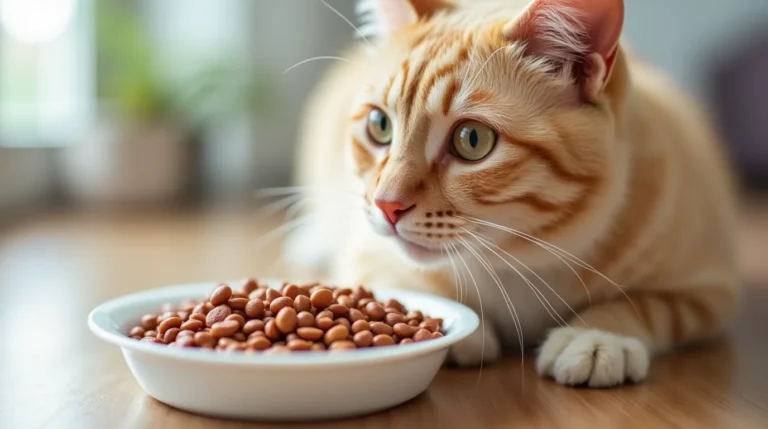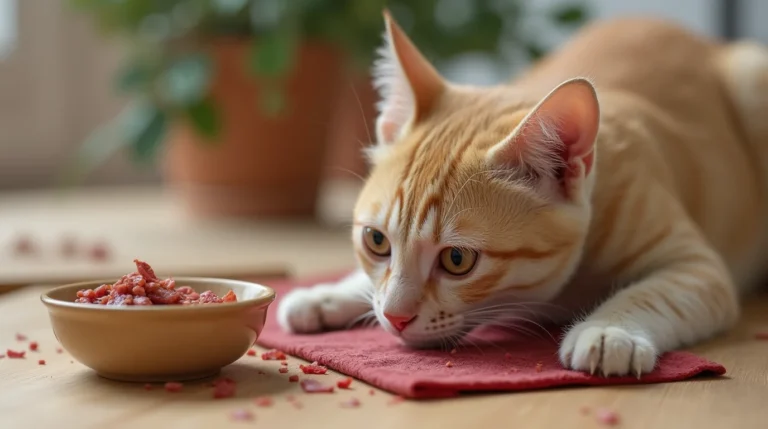Table of Contents
Hyperthyroidism in Cats is a common endocrine disorder in older cats, caused by an overproduction of thyroid hormones. Managing hyperthyroidism requires a multifaceted approach, including medication, surgery, or radioactive iodine treatment. However, diet plays a pivotal role in managing the symptoms and improving your cat’s quality of life
In this article, we’ll explore the importance of diet in treating hyperthyroidism, recommended food choices, and how to tailor a nutritional plan for your feline friend.
What is Hyperthyroidism in Cats?
Hyperthyroidism occurs when the thyroid gland, located in a cat’s neck, produces excessive amounts of hormones, particularly thyroxine (T4). These hormones regulate metabolism, so an overproduction leads to increased energy expenditure and other systemic effects.
Common symptoms of hyperthyroidism include:
- Weight loss despite increased appetite
- Vomiting or diarrhea
- Increased thirst and urination
- Hyperactivity or restlessness
- Poor coat condition
A specialized diet can help manage these symptoms and improve treatment outcomes.
Why Diet is Crucial for Cats with Hyperthyroidism
1. Regulates Hormone Production
Dietary iodine directly affects thyroid hormone production. A low-iodine diet can help reduce the overproduction of T4, providing relief from symptoms.
2. Maintains Muscle Mass
Hyperthyroidism accelerates metabolism, leading to muscle wasting and weight loss. A diet rich in high-quality protein can counteract this effect and help your cat maintain muscle mass.
3. Supports Overall Health
Cats with hyperthyroidism often have concurrent issues, such as heart problems or kidney disease. A carefully balanced diet can address these secondary concerns.
Key Nutritional Components for Cats with Hyperthyroidism
1. Low Iodine
Iodine is essential for thyroid hormone production. Feeding a low-iodine diet, such as Hill’s Prescription Diet y/d, can reduce hormone levels and alleviate symptoms.
2. High-Quality Protein
Cats with hyperthyroidism often lose muscle mass. High-protein diets that include easily digestible animal proteins (like chicken, turkey, or fish) help maintain muscle while supporting overall energy needs.
3. Controlled Phosphorus Levels
Since hyperthyroidism and kidney disease often occur together, it’s crucial to control phosphorus levels to protect kidney function.
4. Omega-3 Fatty Acids
Omega-3 fatty acids, found in fish oil, help reduce inflammation and support heart and kidney health, which are often affected by hyperthyroidism.
5. Calorie-Dense Foods
Hyperthyroid cats burn calories quickly, so their diet should include calorie-dense foods to prevent further weight loss.
Recommended Foods for Cats with Hyperthyroidism
Commercial Options
1. Hill’s Prescription Diet y/d
This veterinary-prescribed diet is specifically formulated to manage hyperthyroidism by limiting iodine intake. It helps normalize thyroid hormone levels without requiring medication.
2. Royal Canin Veterinary Diet Renal Support
If your cat has concurrent kidney disease, this food provides kidney-friendly nutrition while supporting overall health.
3. Blue Buffalo Natural Veterinary Diet Kidney + Mobility Support
This food offers low phosphorus levels, added antioxidants, and omega-3 fatty acids, making it suitable for hyperthyroid cats with kidney concerns.
Homemade Diets
If you prefer to prepare your cat’s food at home, consult a veterinary nutritionist to ensure the diet is properly balanced. A typical homemade diet may include:
- Cooked, lean meats (chicken, turkey, or fish)
- Limited carbohydrates (e.g., sweet potatoes or rice)
- Omega-3 supplements (fish oil)
- Carefully measured iodine levels
Foods to Avoid
Certain foods can exacerbate hyperthyroidism symptoms and should be avoided:
- High-Iodine Foods: Fish like tuna, shellfish, and seaweed contain high levels of iodine and can worsen thyroid hormone production.
- Low-Quality Protein: Avoid foods with by-products or fillers, which may not meet your cat’s nutritional needs.
- Grains and Carbohydrates: Cats are obligate carnivores and do not require large amounts of carbs, which can contribute to weight gain or digestive upset.
Transitioning to a Hyperthyroidism-Friendly Diet
Switching your cat to a new diet requires patience and gradual adjustment to avoid food refusal or digestive issues.
- Start Slowly: Introduce the new food by mixing it with the old food in small amounts, gradually increasing the ratio of the new food over 7–10 days.
- Monitor Your Cat’s Appetite: Hyperthyroid cats may have a fluctuating appetite. Ensure they’re eating enough to maintain weight.
- Provide Fresh Water: Cats with hyperthyroidism often experience increased thirst. Ensure they have access to clean, fresh water at all times.
- Consult Your Veterinarian: Regular check-ups are essential to monitor your cat’s progress and adjust their diet as needed.
Dietary Management and Other Treatments
While diet plays a crucial role in managing hyperthyroidism, it is often used alongside other treatments:
- Medication: Anti-thyroid medications like methimazole help reduce thyroid hormone production.
- Radioactive Iodine Therapy: This treatment targets overactive thyroid tissue, often curing the condition.
- Surgery: In severe cases, surgical removal of the thyroid gland may be recommended.
FAQs About Hyperthyroidism in Cats Diet
1. Can diet cure hyperthyroidism?
No, but a specialized diet can help manage symptoms and improve quality of life, often in conjunction with medication or other treatments.
2. Is a low-iodine diet safe for healthy cats?
No, low-iodine diets are not appropriate for healthy cats and should only be used under veterinary supervision.
3. Can I prepare my own low-iodine cat food?
Yes, but consult a veterinary nutritionist to ensure the diet is balanced and meets all of your cat’s nutritional needs.
4. How long does it take for a low-iodine diet to work?
Results vary, but cats often show improvements in thyroid hormone levels within a few weeks of starting the diet.
5. What if my cat refuses to eat a low-iodine diet?
Try offering different textures (wet vs. dry) or warming the food slightly to enhance its aroma. Work with your vet to find suitable alternatives.
Conclusion
Diet is a cornerstone of managing hyperthyroidism in cats, offering relief from symptoms and improving overall health. By providing a low-iodine, protein-rich, and nutritionally balanced diet, you can help your cat maintain weight, energy levels, and a better quality of life.
Always work closely with your veterinarian to create a diet tailored to your cat’s specific needs, ensuring they receive the care and nutrition they deserve.



